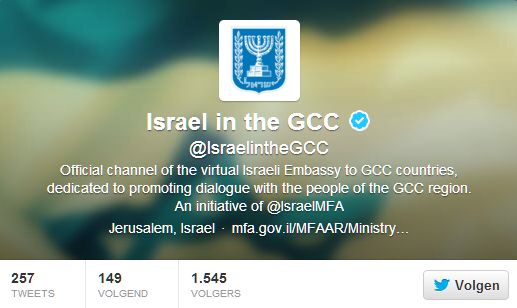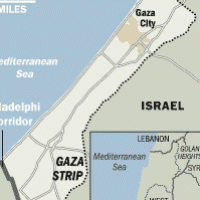![]()
Sun, October 24, 2013 | MEForum | by Jonathan Spyer
First published in PJ Media.

Screenshot from twitter account “Israel in the GCC,” the Israel Foreign Ministry’s “Virtual Embassy” for the Gulf States. (Image by CrethiPlethi)
Recent remarks by Israeli Prime Minister Benjamin Netanyahu have fueled renewed speculation of behind-the-scenes links between Israel and the Gulf monarchies.
Netanyahu, speaking at the UN, said that “the dangers of a nuclear-armed Iran and the emergence of other threats in our region have led many of our Arab neighbors to recognize, finally recognize, that Israel is not their enemy.”
He added: “This affords us the opportunity to overcome the historic animosities and build new relationships, new friendships, new hopes.”
There have been subsequent rumors of visits by senior Gulf officials to Israel, to discuss matters of common interest.
While it is difficult to acquire details of these contacts at the present time, it is a near certainty that they exist, on one level or another. Conversations with Israeli officials suggest that much is happening behind the scenes.
Israel and the key states of the Gulf Cooperation Council (most importantly, Saudi Arabia) share core views on the nature of key regional processes currently underway, and their desired outcome. These commonalities have existed for some time, and it is likely that the contacts are themselves not all that new.
There are three areas in which Israel and the countries of the GCC (with the exception of Qatar) are on the same page.
They are: the urgency of the threat represented by the prospect of a nuclear Iran, the danger represented by the rise of the Muslim Brotherhood over the last two years, and the perception that the United States fails to understand the urgency of these threats and, as a result, is acting in a naive and erroneous way on both.
On the Iranian nuclear issue, Riyadh is deeply troubled by the current Iranian ‘charm offensive’ and its apparent effects on the west. Most importantly, the Saudis fear the prospect of a nuclear Iran, which could force Riyadh and the Gulf states to bend to its will, in return for guaranteeing the flow of oil through the Straits of Hormuz, and avoiding direct encroachment on their sources of energy.
Saudi Arabia faces Iran, directly across the Gulf. It is a far more fragile construction than its Shia, Persian neighbor. Over the decades, Riyadh and the other Gulf states sought to balance Iranian encroachment of this type through alliance with the U.S.
But the U.S. no longer seems such a reliable ally. So new strong and like-minded friends are needed.
On the Muslim Brotherhood, the Saudis feared the spread of this movement across the region, and were infuriated by the role of Qatar in supporting its successes in recent years.
Israel, too, was deeply concerned at the prospect of a new alliance of Sunni Islamist states, with AKP-led Turkey and Morsi’s Egypt chief among them.
Over the past year, the advance of the Muslim Brothers has been halted and partially reversed. In Tunisia and Egypt, the MB administrations have gone. Qatar has a new, less activist emir. The Muslim Brothers and Qatar have grown weaker among the Syrian rebels.
Saudi Arabia has been responsible for some of this, through financial support and political action. It has welcomed all of it. So has Israel.
On the U.S.: the Saudis think that the current U.S. administration is hopelessly naive on the Middle East. They were shocked at the abandonment of Hosni Mubarak of Egypt in 2011. They are equally vexed at the current indications of American and Western willingness to lift some sanctions against Iran in return for cosmetic concessions that would leave the core of Teheran’s nuclear program intact.
The Saudis were the first to congratulate General Abd al-Fatah al Sissi following his military coup in early July. They are utterly dismayed by the current U.S. withholding of part of Washington’s package of military aid to Cairo because of what the U.S. regards as the insufficiently speedy transition back to elections in Egypt.
Again, Israel shares these perspectives. The absence of American leadership may well be the key factor in causing Israel and the Gulf states to draw closer.
On the face of it, any alliance between Jewish Israel and Salafi Saudi Arabia might appear an absurdity. Israel is a liberal democracy and a Jewish state. Saudi Arabia is a repressive absolute monarchy, based on a particular Salafi Muslim outlook which is deeply anti-Jewish and anti-Christian in nature.
This ideology is not a dead letter for the Saudis. Rather, they invest heavily in spreading their particular rigid form of Islam in the west and elsewhere. Their media and education system are rife with anti-Jewish prejudice.
But a clear distinction is made by the Saudis between the world of ideology/media/culture and the realm of raison d’etat. Hence, there is no reason to think they would not be able to publicly vilify Israel, while maintaining off the radar links with it against more immediate enemies.
In this regard, it is worth remembering the Wikileaks revelation of remarks made in private by Saudi King Abdullah to American General David Petraeus in April, 2008, in which he recommended military action against the Iranian nuclear program. The king referred to Iran as the “head of the snake,” which should be cut off. No similarly venomous remarks on Israel were quoted from the conversation, which took place far from the public eye.
Of course the common interests only go so far. Saudi Arabia supports Salafi Islamist forces in both Syria and Egypt. Saudi money finds its way to Salafi elements among the Palestinians. But the areas of commonality are on issues of cardinal importance to both countries.
The de facto, unseen alliance between Israel, Saudi Arabia and the GCC countries is one of the most intriguing structures currently emerging amid the whirling chaos of the Middle East.
Jonathan Spyer is a senior research fellow at the Global Research in International Affairs (GLORIA) Center, and a fellow at the Middle East Forum.



 RSS
RSS










While the Islamists insist on girls hide their face behind a Hijab, they encourage them to uncover their modesty and practice prostitution Jihad. Isn’t it wonderful!!!!!